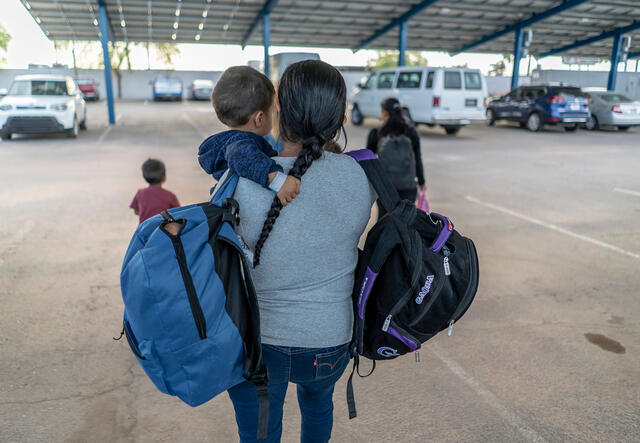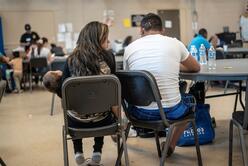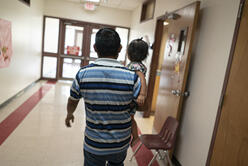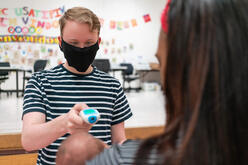
Currently 150-250 asylum-seekers are arriving daily in Phoenix, fleeing violence and persecution in their home countries for the safety and freedom of the United States. The International Rescue Committee (IRC) and our partner organizations are providing critical humanitarian assistance to these families when they arrive, including food, shelter, and medical assistance.
Read more to learn about who asylum-seekers are, what help we are providing, and how you can help!
Why are asylum-seekers arriving in Phoenix?

Seeking asylum is a legal right under federal law, where those who are fleeing violence and persecution can seek protection in the United States. Asylum-seekers are released from federal detention while their court case is ongoing. Asylum-seekers have sponsors, usually close family members, in the United States. Asylum-seekers are typically in the Phoenix area for 24-48 hours while arranging travel to their sponsor family. Some asylum-seekers stay in the Phoenix area with their sponsor families if the sponsors live in the area.
Most asylum-seekers in the Phoenix area are from Latin American countries. In 2018 and 2019, most asylum-seekers were from Mexico, Guatemala, El Salvador, and Honduras, fleeing the gang violence in those countries. Natural disasters, rising poverty, gender-based violence and COVID cases are plunging millions into even deeper crisis, contributing to continued migration from Central America. Most families and individuals who have arrived in 2021 were from Cuba, Brazil, and Venezuela, fleeing political persecution and unrest in those nations. There was also a significant number of individuals from India and Haiti. These continue to be the top countries of origin arriving at the IRC Welcome Center in 2022.
What is the IRC doing to help?

In late 2018 and early 2019, over 40,000 asylum-seekers arrived in the Phoenix area. In 2021, the IRC Welcome Center received over 38,000 asylum-seeking individuals. The IRC worked with partners, including local churches and community organizations, to provide emergency humanitarian programming.
In 2022, the IRC and our partners continue to provide essential humanitarian assistance, including:
- Food
- Shelter
- Covid-19 screening and medical check
- Clothing and hygiene products
- Face masks and hand sanitizer
- Toys and safe play areas for children
- Travel assistance
- Legal orientation
Upon arrival to Phoenix, many asylum-seekers have little more than the clothes they are wearing or a backpack of items they have brought from home. The journey to the United States is difficult and often traumatic. Providing this humanitarian assistance allows for families to feel safe and welcome. Additionally, providing travel assistance and legal orientation gives asylum-seekers the support to reunite with their families and stay in the legal process.

In response to the COVID-19 pandemic, the IRC has worked with the Maricopa County Department of Public Health (MCDPH) to create strong preventative measures. Rapid tests are provided to all asylum-seekers upon arrival in Phoenix by the IRC Welcome Center's Southwellness. Those who test positive for COVID-19 are referred to quarantine with MCDPH. All asylum-seekers, staff, and volunteers are required to wear masks and wash hands. The IRC and partners have developed in-language materials about the pandemic and educate asylum-seekers about best practices upon arrival.
The IRC is in regular communication with charitable partner organizations, federal government agencies, and local government. We are working in collaboration to provide a safe, orderly, and dignified welcome to families and individuals. Our key partners include Gathering Humanity, Interfaith Refugee and Asylum Volunteers, Refugee Aid, Matthew 25, First Church UCC, Legistlative District 28, Uncage and Reunite Family Coalition, Church of Jesus Christ of Latter-day Saints, HandsOn Greater Phoenix, Salvation Army, and St. Vincent de Paul, who work to provide volunteers, donations, and food for asylum-seekers.
Beyond our essential humanitarian assistance, the IRC in Arizona provides long-term case management services for asylum-seekers who live in the Phoenix area. The IRC also manages the Arizona Asylum Network, which connects pro-bono medical providers to asylum-seekers to conduct medical evaluations.
How You Can Help
Our work is only made possible by the generosity of the Arizona community. Here’s how you can help:
- Donate online to our Phoenix programs for asylum-seekers
- Donate essential items through our Amazon Wishlist, such as food and clothing
- Apply to be a volunteer with the IRC
At this time, we are not asking for in-person donations for asylum-seekers as a safety and health precaution.